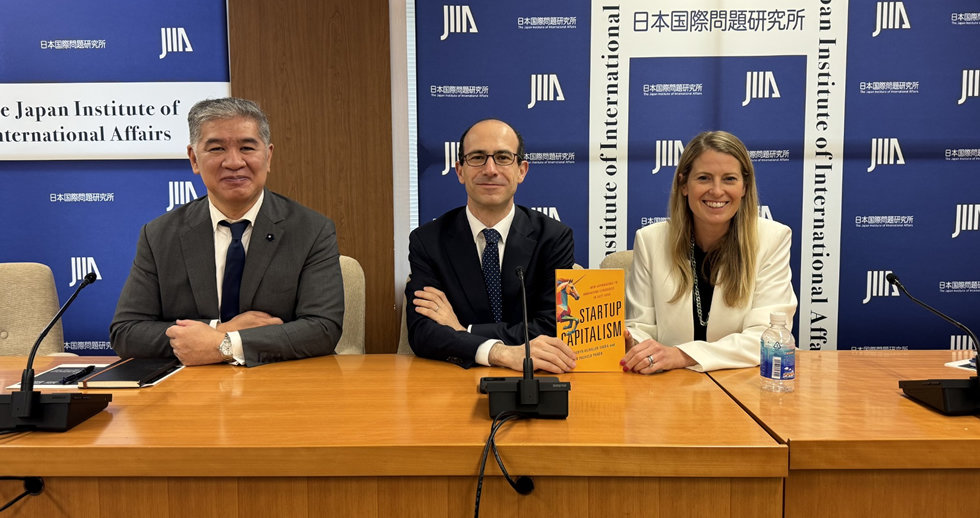Guest speakers :
-
Dr Robyn Klingler-Vidra
Vice Dean, Global Engagement, and Reader in Political Economy & Entrepreneurship at King's Business School, King's College London -
Prof. Ramon Pacheco Pardo
Head of Department & Professor of International Relations, Department of European & International Studies, King's College London
Robyn Klingler-Vidra began by noting the increased governmental focus on startup support, positioning this involvement as part of a broader strategy to boost national competitiveness. This raised a central question: is this a genuine shift in economic policy or an adaptation of existing models? The conversation explored whether the purpose of supporting startups today is aimed at transforming existing economic structures, in a Schumpeterian "creative destruction" pattern, or reinforcing national strengths.
Although the government rhetoric surrounding startup support often suggests innovation and disruption in existing economic and competitiveness frameworks, much of what is being pursued reflects a high degree of continuity with established economic models, especially in Northeast Asia.
Professors Klingler-Vidra and Pacheco Pardo introduced a conceptual framework called "startup capitalism," where startups are treated not just as agents of innovation but also as vital resources to enhance technological competitiveness and economic security, ensuring their countries maintain an edge in the global economy. Instead of challenging existing firms, startups in East Asian countries (China; Japan; South Korea; Taiwan) are increasingly woven, in different degrees, into the fabric of state-led economic strategies.
In the case of Japan, startups do not necessarily challenge the keiretsu but increasingly work with them in order to reinforce the Japanese economy as a whole. This collaboration is encouraged by the state, as evidenced by the J-Startup initiative, launched in 2018 by METI and JETRO, which aimed to cultivate 20 unicorns by 2023. However, this target has fallen short with only 4 new unicorns created. Despite this, the program continues with a new ambition to generate 100 unicorns.
Over the years, the Japanese government has gradually moved towards a more flexible labor environment by relaxing norms around permanent employment for instance, enabling more entrepreneurial activity. Japan has also introduced policy tools such as the Innovator Visa to attract foreign talent. There has also been a significant growth in the funds available for venture capital in Japan, which now boasts half of the world's most active corporate venture capital firms. One notable example is the partnership between the city of Kobe and the U.S.-based fund 500 Startups, supported by SMBC, which aims to stimulate startup activity in Kansai.
The discussion highlighted that while Japan's model is probably more stable and conservative than the other three countries, it is also evolving through policies such as regulatory changes to encourage second-time entrepreneurship and lower the stigma of failure. Cultural differences in risk tolerance are vital to understand the various approaches in startup capitalism.
South Korea offers another example of a coordinated state-led approach. In 2014, the government established 18 Centers for Creative Economy and Innovation (CCEI), each aligned with a chaebol and focused on nurturing startups within specific industries. This model therefore fosters close collaboration between established conglomerates and emerging companies.
More recently, the Korean government launched the K-Startup Grand Challenge in 2023, inviting both domestic and international entrepreneurs to contribute to the local startup ecosystem. To facilitate this, a new entrepreneur visa has been introduced, reflecting the belief that foreign investors and entrepreneurs are essential to maintaining the country's innovation capacity. This visa also enables foreign entrepreneurs to gain access to chaebols.
Taiwan is something of an outlier in this regional landscape. From early on, small and medium enterprises were meant to be both suppliers and innovators, responding to an existential imperative from a national security perspective in front of China. The Taiwanese government has gradually expanded equity investment for startups and unlike Japan and South Korea, Taiwan's startup policies are less focused on shoring up established firms and abilities, and more oriented toward cultivating new capabilities.
In 2017, the government expanded its equity investments in emerging sectors such as green energy, the Internet of Things, and new technologies--noticeably excluding semiconductors, despite Taiwan's dominance in that industry. Such a policy received criticism from TSMC founder Morris Chang, showing yet another evidence of the government's shift towards fostering innovation not only in existing companies, but primarily in new activities and capabilities.
China represents a form of mixture of all these models, depending on the industry. In sectors like e-commerce, startups have been allowed to compete directly with established firms, leading to the rise of giants like Alibaba. In contrast, strategic sectors such as semiconductors and AI are characterized by a more cooperative framework, where the government fosters collaboration between startups and incumbent firms to achieve long-term national objectives.
Out of the four countries under study, the Chinese model is probably the most efficient, but drawing such a comparison would be unfair given the considerable difference in size and power between China and the other three countries.
The conversation closed with a reflection on the theoretical implications of these developments. Traditionally, startups have been celebrated as disruptors, in line with Schumpeter's theory of creative destruction. However, in the Northeast Asian context, startups are more often embedded within existing economic structures, serving to strengthen rather than upend them. The open innovation paradigm, which emphasizes collaboration and mutual benefit between startups and established firms, is gaining traction. Governments are increasingly positioning startups as national resources that can enhance competitive advantage without necessarily challenging the dominant order. The emphasis is thus less on disruption and more on integration, with startups contributing to long-term national goals in technology, security, and economic growth.



